
MRA’s Ask Us First program connects members directly to our team to provide key information to help you stay focused on your business. This year, we had some questions asked multiple times. We’ve listed our most frequently asked questions here for quick reference.
How do I find my EIN?
If you previously applied for and received an Employer Identification Number (EIN) for your business, but have since misplaced it, try any or all of the following actions to locate the number:
- Find the computer-generated notice that was issued by the IRS when you applied for your EIN. This notice is issued as a confirmation of your application for, and receipt of an EIN.
- If you used your EIN to open a bank account, or apply for any type of state or local license, you should contact the bank or agency to secure your EIN.
- Find a previously filed tax return for your existing entity (if you have filed a return) for which you have your lost or misplaced EIN. Your previously filed return should be notated with your EIN.
- Ask the IRS to search for your EIN by calling the Business and Specialty Tax Line at 800.829.4933. The hours of operation are 7:00 a.m.-7:00 p.m. local time, Monday through Friday. An assistor will ask you for identifying information and provide the number to you over the telephone, as long as you’re a person who is authorized to receive it. Examples of an authorized person include, but are not limited to, a sole proprietor, a partner in a partnership, a corporate officer, a trustee of a trust, or an executor of an estate.
What is surcharging?
Credit card surcharging is when a merchant applies an extra fee if a customer chooses to pay via credit card instead of a different payment. MRA offers a surcharging opportunity to our merchant processing customers, allowing you to keep more of your money in your business.
Learn more about how surcharging can help your business.
How do instant rebates work when it comes to sales tax?
When a customer receives an instant rebate provided by a third party, sales tax is calculated according to the original cost of the item. These rules are set by the Michigan Department of Treasury.
Is pre-packaged food subject to sales tax?
Sales of food in Michigan are mostly tax-free unless it is prepared food. If you are selling pre-packaged food items that are not heated or intended for immediate consumption they should not be subject to sales tax. Use this link from the Michigan Department of Treasury that provides more details when food is taxable: Michigan RAB 2022-4 Sales Tax Food for Human Consumption.
Is there a minimum time that someone has to be employed to qualify for unemployment?
The qualifications for unemployment are specific to the individual, not who employed them. It’s based on pay and their income the prior year to calculate if an individual qualifies.
When a claim is filed, Michigan’s Unemployment Insurance Agency (UIA) checks its wage database to see whether the unemployed worker had sufficient earnings to be entitled to establish a new claim. UIA considers the total wages paid to the unemployed worker in the first four of the last five completed calendar quarters. This period is called the base period of the claim. The calendar quarters are 3-month periods that run as follows:
Quarter 1 – January 1 through March 31
Quarter 2 – April 1 through June 30
Quarter 3 – July 1 through September 30
Quarter 4 – October 1 through December 31
In some cases, the unemployed worker will not have sufficient wages during the base period to establish a new claim. UIA will then check the wages paid to the unemployed worker in the four most recently completed calendar quarters, known as the alternate base period. If UIA finds sufficient wages to establish the claim, UIA asks the unemployed worker about the reason he or she was separated from each of the employers in the base period of the claim, and from the most recent employer. UIA also asks the unemployed worker about his or her dependents. If the unemployed worker disagrees with any of the wage information or about any of the employers we located in our wage database for that unemployed worker, the unemployed worker is asked to correct the information.
What are the current rules for COVID?
All of the governor’s Executive Orders and Michigan Department of Health and Human Services (MDHHS) Epidemic Orders regarding mask mandates, social distancing, capacity limits, health screening requirements, and mandatory quarantine etc. for retail, including grocery stores, were rescinded in June of 2021. As of this writing (November 2022) there are no protocols in place for retail stores in Michigan. With that being said, retailers are expected to follow all standard MIOSHA rules and guidelines.
